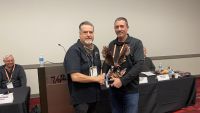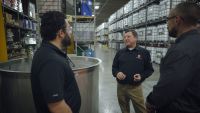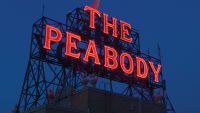Contractor to Contractor: Senate Masonry, Inc.
By Masonry
Everett T. Greenstreet Jr. ? Senate Masonry, Inc., Bethesda, MD
Looking over the Senate Masonry timeline available on their web site, it's almost like walking through the last century of masonry in Anywhere, America. Pictures through the decades from 1917 to present sport images of Temple Greenstreet ? who started as a bricklayer in 1900 ? with trowel in hand, Everett Greenstreet Sr. at a MCAA function in the '50s, Everett Jr. at a dedication, and the fourth generation, Everett III and Shane, carrying on the tradition. We had the wonderful opportunity to speak with Everett Greenstreet Jr. about this journey through the years and the lessons they've learned together.
Masonry: The Greenstreet family, through four generations, has over 100 years in the masonry industry. Do you think that having those years of family involvement has made your company stronger than others?
Greenstreet: I think the fact that four generations of our family have been involved in the industry gives us a wealth of knowledge, to which a first- or second-generation company may not have access. When a conflict arises, it is not uncommon that we draw solutions from how our father or grandfather handled a similar situation.
Masonry: Senate Masonry has evolved quite a bit over the generations, first opening as TB Greenstreet & Sons in 1917, Congress Masonry in the '50s, and Senate Masonry in 1979. What do you think has been the key to your company's growth and success over the years?
Greenstreet: I think the key to our success stems from the relationships we have with our customers, vendors and employees. Our company is a family business and we like to consider the people we employ and clients we serve as part of our extended family.
Senate Masonry has remained a small business because we do not want to sacrifice the personal attention we give to each client. As organizations grow larger, too often the personal touch of the business is lost in the bureaucracy.
Masonry: Quality work and on-time performance are often the goals that mason contractors strive to achieve. Senate takes this a step further by also listing "principle-centered values and ethics" as one of its goal. What values and ethics are you striving to achieve and how have these qualities helped your organization?
Greenstreet: Honesty, accountability and excellence are goals we are striving to achieve. When customers and suppliers know you are accountable and honest in your business, they enjoy working with you. Excellence is something we put forth each day. Quite simply, we try to be the best we can be.
I think all of these goals have helped us grow closer as a company and pulled us through the ups and downs of the economy.
Masonry: For the Hecht's Warehouse project ? which was featured on the front page of the Washington Times Metro section ? Senate Masonry repaired and installed glass block for the art deco crown that adorns the top of the warehouse, and installed and braced the glazed brick bands on the building. What unique obstacles did this magnificent project present?
Greenstreet: This project was unique in one aspect in that I had worked on it when I was 19 years old, when my father received a contract to repair parts of the warehouse in the 1960's. Three generations of Greenstreets have left their mark on this building, with my son Shane being the third.
One of the challenges we faced was the layout of the radius. Drawing back from the good old days, we stretched out piano wire and our bricklayers followed it around.
Another challenge was to fix the movement of the walls due to cracking and spalling of the joints ? bricks were literally cracking and exploding out of the walls. To cure the cracking and spalling, we installed control joints from top to bottom ? this key factor was left out of the original design. In Washington, D.C., we have over 40 freeze-thaws a year, which makes control joints a must.
Masonry: Senate Masonry has completed many government projects over the years, including Andrews Air Force Base and Marine Corps Base Quantico. What are some examples of how these jobs differ from your typical residential or commercial projects?
Greenstreet: Government jobs are unique due to the simple fact that the specifications and inspection are much more rigid than any private-sector work. On top of that, 9/11 has changed the security climate on most government jobs. Work performed on any military base or high profile executive buildings is going to get more expensive for the government due to the time and paperwork it requires just to get your workforce on and off the base.
In 2003, our firm did work in a high security area on Fort Belvoir in Virginia. This job posed as quite a challenge for our crew getting to the work site each day. Just to get to the site, workers had to pass through two search areas where vehicles and persons are searched. On top of this, all non-citizens were required to have a citizen escort them on and off the job. This posed as a challenge for us because most of our workforce are in the United States on non-resident work visas.
I think that this security issue, on top of the inspection and rigid specifications, makes government work much more of a challenge than private work.
Masonry: Senate Masonry not only has the masonry experience, but also the fourth generation has pursued college degrees and coursework in business administration, accounting, UCC law and construction management. Do you feel that masonry experience is no longer enough to survive or excel?
Greenstreet: I think the biggest misconception mason contractors have today is that simply knowing the masonry trade is all you need to stay in business. No matter what you're selling, companies must pay just as much attention to marketing and finance as they do on operations.
On top of this, I think that surrounding your company with business savvy people can only better the organization. Applicants with degrees in business and construction management are great assets. All too often, these graduates go to General Contractors. It would be great to see some of these folks funneled into the masonry trade, as well other subcontracted divisions.
Masonry: Senate Masonry utilizes a company web site in its marketing plan. How has this tool affected your business?
Greenstreet: I think that our web site is probably one of the most important facets our business has added in the past year. In the first three months alone, our web site received 35,000 hits! I think that speaks for its effectiveness as a tool.
As a service business, we don't have the luxury of walk-in traffic like a retail business owner enjoys. The web site gives the customer a chance to look into our "store" and see what we have to offer ? I call it our virtual office. Once they look around our site, they now have a face to go along with countless images of buildings we have done. It gives them confidence in our legitimacy and capacity to perform.
Most project managers that are coming up these days have grown accustomed to searching the Internet for subcontractors. One of our most important clients will not use a subcontractor without a web site. They feel a web site shows the company's professionalism and attention to new technology. I think they're right.
Masonry: What is the best advice you would give a budding mason contractor?
Greenstreet: Concentrate on your business as a whole. Obtain knowledge on finance and marketing, as well as operations. One of the best books I have read is "The E Myth" by Michael Gerber. Grab a copy and work on your business as a whole. Embrace technology like the web, computer-aided estimating and project management. Embrace these tools and use them!
Masonry: What do you feel is the biggest misconception about the masonry industry?
Greenstreet: I think the biggest misconception about the industry is that we haven't changed. Many General Contractors (GCs) don't realize the technology that has been introduced. For example, the grout pumps, advanced scaffolding and computerized estimating.
Masonry: What would you do to change that misconception?
Greenstreet: I think organizations like MCAA and BIA need to make greater pushes at educating GCs and architects on the growth of the masonry industry. I think speaking engagements at GC organizations, such as the Associated Builders and Contractors (ABC) or Associated General Contractors (AGC), would be a start.
Masonry: What are your three biggest concerns in keeping your company successful?
Greenstreet: The three biggest concerns I have to keeping my company healthy are cash flow management, consistent marketing efforts to attract new customers, and developing quality foremen.
Masonry: What do you feel are the most critical issues you'll face with future government regulations?
Greenstreet: I think some of the most critical are tax legislation for small business, as well as rising workers compensation cost.
Masonry: Which group do you feel has the bigger impact on masonry's future: architects, engineers or general contractors?
Greenstreet: I think architects pose the biggest impact. I think educating the new generation of architects will be crucial to our growth.
Masonry: What do you like most about being a member of MCAA?
Greenstreet: I enjoy many facets of being a member. The convention and Masonry magazine are some of my favorites.
About the Author
Masonry, the official publication of the Mason Contractors Association of America, covers every aspect of the mason contractor profession - equipment and techniques, building codes and standards, business planning, promoting your business, legal issues and more. Read or subscribe to Masonry magazine at www.masonrymagazine.com.















